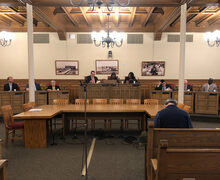Stephen Barton, panel of experts open discussion on gun control
Yuki Mizuma | Staff Photographer
Stephen Barton, a 2012 Syracuse University alumnus who is an outreach assistant for Mayors Against Illegal Guns in New York City and a victim of the July 2012 movie theater shooting in Aurora, Colo., gave the keynote speech during the discussion on gun control at SU on Tuesday night.
CORRECTION: In a previous version of this article, the title of the event was misstated. The event was “Guns and America: Joining the Conversation.”
The gun control discussion has officially begun at Syracuse University.
“Guns and America: Joining the Conversation,” an event held Tuesday at Hendricks Chapel, consisted of a diverse panel that took questions from the audience on issues such as gun control, gun violence and mental health. It was the first of many events this year to get the Syracuse community more involved in national gun control dialogue.
Stephen Barton, a 2012 SU alumnus who is an outreach assistant for Mayors Against Illegal Guns in New York City and a victim of the July 2012 movie theater shooting in Aurora, Colo., gave the keynote speech for the event.
“This isn’t an urban issue or a gang issue or a minority issue,” Barton said. “It’s an American issue, and it affects us all.”
Grant Reeher, a professor of political science in the Maxwell School of Citizenship and Public Affairs and director of the Campbell Public Affairs Institute, moderated the event. Questions from the audience were written and submitted while the panel gave its opening statements. Questions were also asked through Twitter with the hashtag #SUGunTalk.
Mental health was the first topic addressed. James Knoll, director of the Forensic Psychiatry Fellowship Program at the State University of New York Upstate Medical University, said it’s important to remove the negative stigma of mental health, since it often prevents patients from coming forward and accepting mental health care.
Knoll blamed this stigma mainly on public figures that associated mentally ill patients with shooting tragedies such as that in Newtown, Conn.
“It’s profoundly selfish, mental illness or not, to vent one’s rage at the horrific expense of others for a moment of satisfaction,” Knoll said.
A lot of focus went toward the New York gun control law, which was the first law passed in the United States after the Newtown shooting. Scott Armstrong, political communications consultant and former New York state lobbyist for the National Rifle Association, said the law focused too much on keeping guns away from gun-owners who hadn’t broken laws, rather than punishing those who had broken them.
“It is a sickening feeling that your government labels you a potential criminal when you have done nothing different, you have done nothing wrong and you’ve done nothing to hurt,” Armstrong said.
Other topics addressed included the role of the media. Common Councilor At-Large Helen Hudson, former president of Mothers Against Gun Violence, said violence in video games and the news has been sensationalized, and makes many people accept it as a part of their lives.
Hudson also addressed structural violence, saying gun violence often takes place in and is blamed on specific communities, making it harder to stop gun violence in these areas.
“You‘ve got to get people out of that,” Hudson said. “If not, it just starts to snowball into that culture.”
After the event, Hudson said she felt the panel discussion led to great dialogues, and that even she was made more aware of certain topics such as mental health. She and Armstrong made dinner plans to discuss their different ideas further.
“We’re going to have disagreements across the board, but you know what? At least we’re talking about it,” she said.
Thomas Wolfe, senior vice president and dean of student affairs at SU and the main organizer of the event, said he felt the event accomplished its goal of creating spirited dialogue.
He said his personal highlight was Barton’s speech, adding that Barton has given his life to the issue and his speech was a great statement on the remarkability of SU students. He said he hopes Barton will be able to come to future events, which will focus on more specific topics, to continue the discussion.
Said Wolfe: “Stephen is always welcome at Syracuse University.”
Published on February 20, 2013 at 1:08 am
Contact Max: meantonu@syr.edu





